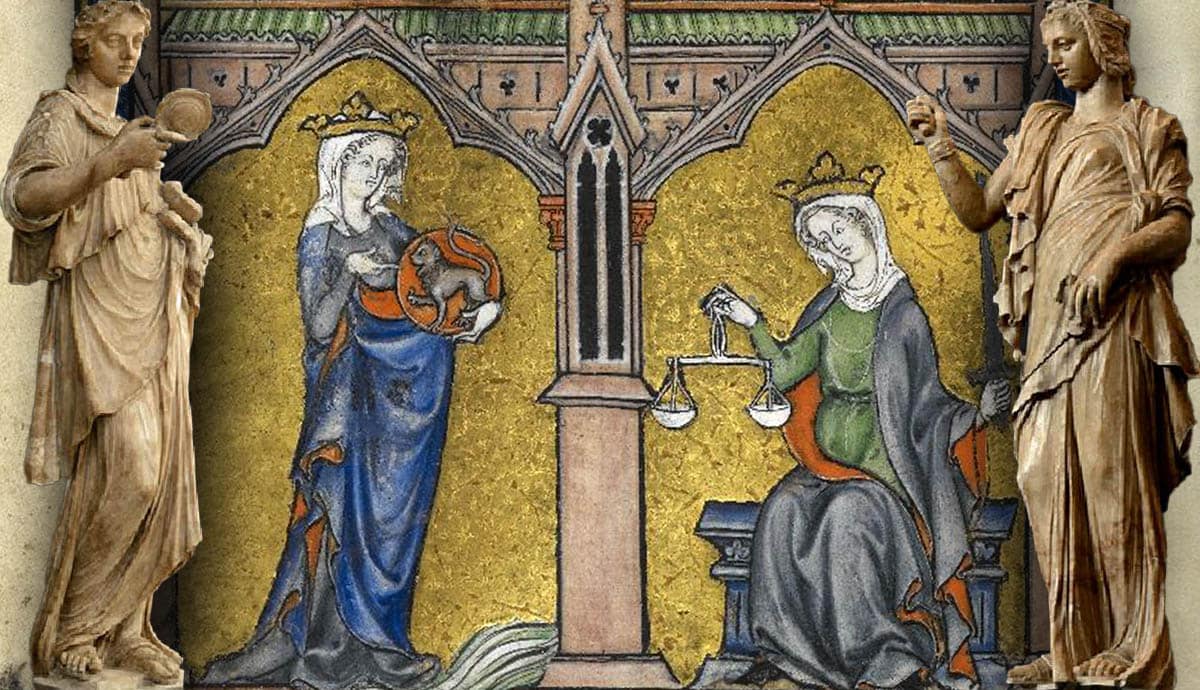
Aristotle — an ancient Greek philosopher from the fourth century BCE — is one of the most influential thinkers in Western history. Like many of his contemporaries, he dedicated much of his work to understanding the world, delving into what leads to happiness and what makes a life good. For Aristotle, the two were intricately linked. In his mind, virtue tied the two together, leading him to conclude that happiness was a state of flourishing achieved through virtue and that living virtuously was the ultimate goal of a good life.
Aristotle Used the Term Eudaimonia to Describe Happiness

When Aristotle discusses happiness, he uses the concept of eudaimonia, often translated to happiness, but more often than not meaning to flourish. Eudaimonia goes beyond modern-day definitions of happiness, which often include feelings like contentment, pleasure, and satisfaction. Aristotle’s meaning transcends these fleeting emotions, and instead, he uses eudaimonia to conceptualize a more permanent state of being. For Aristotle, happiness is not a momentary mood. It is a state of living well, characterized by fulfilling one’s inherent potential and actualizing virtues.
Cultivation of Virtue Leads to Eudaimonia

Eudaimonia is achieved by cultivating moral and intellectual virtues. Aristotle differentiates between the types of virtue based on how they are acquired: moral virtues (such as temperance) require practice, and intellectual virtues (such as wisdom) require reason. Both types of virtue are found by living between extremes. For example, courage — a moral virtue — is between cowardice (a deficit of courage) and recklessness (an excess of courage). Eudaimonia is all about flourishing, and flourishing needs balance. One must determine the middle ground for both types of virtue and act accordingly to flourish. Only once that is achieved can the good life be sought.
Contemplation is Essential for Living a Good Life

A key component of Aristotle’s definition of the good life is happiness. But the flourishing state of eudaimonia — achieved by cultivating virtue — is essential because it involves contemplation. Though he acknowledges the importance of all virtues, for Aristotle, the most significant virtues were intellectual ones because those required reason and rational reflection. Aristotle believed that when one takes the time to think through the highest truths and principles, they connect with a higher plane of existence — the divine and the eternal. By connecting to that higher plane, one’s soul can grow and flourish, leading to happiness. That flourishing state, in turn, gives way to a level of excellence toward which all humans should strive. That level of excellence is necessary for a good life.
The Good Life Requires More than Just Happiness in All Areas

Although Aristotle makes it clear that happiness is important in his definition of the good life, there are other key aspects as well. Aristotle believed that friendships and community play a significant role, not only because they can contribute to well-being but also because they provide an opportunity for moral growth and the chance to practice virtue. Politics was also deemed important because it provided the basis for society’s construction. If the right foundations were implemented, it would make it much easier for individuals to pursue the good life. However, it is important to remember that areas like friendships, community, and politics were essential because they provided opportunities to expand virtue, which leads to more happiness. Although happiness is not the only aspect in Aristotle’s definition of the good life, it is the end to which all others lead.
Happiness and the Good Life Depend on Each Other

Aristotle’s definitions of happiness and the good life are rooted in the same frameworks, leaving them intricately linked. To reach a state of eudaimonia — Aristotle’s conceptualization of happiness — one must act virtuously. Virtue is found by living in the mean between two extremes. Acting virtuously requires contemplation and reflection, which Aristotle deems essential to the good life. Virtuous action also extends into the community, helping to develop friendships and increase civic engagement, and these lead to further happiness. For Aristotle, virtue ties the definitions of happiness and the good life together, and without one, the other would be incomplete. Happiness is a necessity for the good life, and a good life is achieved by being happy.










